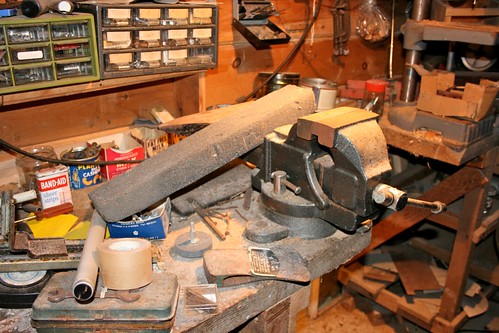If you want to have a good read about the history and future of the "making" movement in education and tinkering as "a mindset for learning," I highly recommend the book "Invent to Learn: Making, Tinkering, and Engineering in the Classroom -- by Sylvia Libow Martinez and Gary Stager.
Go to their website for an overview of the chapters, with links to extended resources for each.

The best thing it did was to send me back to read/re-read Seymour Papert, the grandfather of the movement. (I didn't realize the roots of his projects were in Maine.)
I also refreshed my acquaintance with the writings of Mitchel Resnick (head of the MIT Lifelong Kindergarten group) re the cycle of imagine, create, play, share, reflect, imagine. And a biography of Nikola Tesla is on my "to read" list.
A few notes/quotes from the book:
Reading the book, I remembered my father's workshop down cellar in the house in Maine where I grew up. We loved to make things with him. My biggest project was a bookcase that would double as my bed's headboard. Mainly we marveled at how he could fix things. He was definitely a tinkerer.
A few years ago it was time to clear the workshop out. After all, he'd been dead for some twenty years and no one was using it. But I took some last photos.
Go to their website for an overview of the chapters, with links to extended resources for each.

The best thing it did was to send me back to read/re-read Seymour Papert, the grandfather of the movement. (I didn't realize the roots of his projects were in Maine.)
I also refreshed my acquaintance with the writings of Mitchel Resnick (head of the MIT Lifelong Kindergarten group) re the cycle of imagine, create, play, share, reflect, imagine. And a biography of Nikola Tesla is on my "to read" list.
A few notes/quotes from the book:
Stager's hypothesis: "A good prompt is worth a thousand words." -- where 'good' means it has (a) brevity (e.g., can fit on a post-it note), (b) ambiguity (let the learner be free to satisfy the prompt in their own voice), and (c) has immunity to assessment. (60-61)
Learners can exceed expectations with the following four variables in place:
-- a good prompt, motivating challenge, or thoughtful question
-- appropriate materials
-- sufficient time
-- a supportive culture, including a range of expertise (60)
"Great teachers know that their highest calling is to make memories." (67)
"Constructivism is a theory of learning that doesn't mandate a specified method of teaching.... Constructionism is a theory of teaching. We believe that constructionism is the best way to implement constructivist learning." (71)
Advice: skip the pre-load, don't overteach planning, encourage continuous improvement, allow reflection. (77)
Assessment interrupts the learning process. Even asking a kid what they're doing is disruptive. (81)
"Writing, filmmaking, and presenting information are the low-hanging fruit of creative expression in the digital age." (84)
"The role of the teacher is to create the conditions for invention rather than provide ready-made knowledge." -- Seymour Papert (157)
Educators need to be reminded that it is possible to learn without being taught. (202)
Reading the book, I remembered my father's workshop down cellar in the house in Maine where I grew up. We loved to make things with him. My biggest project was a bookcase that would double as my bed's headboard. Mainly we marveled at how he could fix things. He was definitely a tinkerer.
A few years ago it was time to clear the workshop out. After all, he'd been dead for some twenty years and no one was using it. But I took some last photos.

Full Flickr set here

This comment has been removed by the author.
ReplyDeleteThere would be more prospects to be discussed in detail which must have been followed by the individuals to proceed further. personal statement editing service
ReplyDeleteWe loved to make things with him. My biggest project was a bookcase that would double as my bed's headboard. Mainly we marveled at how he could fix things. math statement of purpose
ReplyDelete